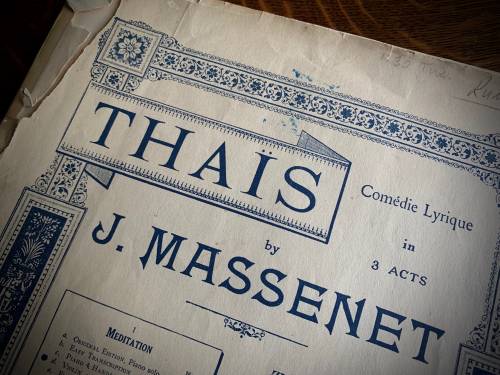Faith at the Opera
Thaïs and Athaniël
by Ken Rummer
The holiest person in all the land sets out to convert the most notorious sinner. What could possibly go wrong?
The story, staged in the opera Thaïs (tah-eece), takes place in Roman Egypt in the AD 300s. Athaniël is a Christian monk renowned for his holiness. Thaïs is a priestess of Venus celebrated for her beauty.
She has grown wealthy from the gifts of men who appreciate her full service companionship. He has taken vows of celibacy and believes God is calling him to confront Thaïs and lead her to repentance and faith.
The drama reaches a high point when Athaniël meets Thaïs in her palace at night. He sets before her a vision of heavenly love. She speaks of the kind of love that need not wait for heaven. Each is tempted, but both manage to resist.
Later, alone, Thaïs mulls Athaniël’s words. Should she continue a life where love is temporary but so far profitable? Or give it all up to seek the love that never ends?
And it is here in the opera, as Thaïs is wrestling with her choice, that the solo violin plays. The song of the angels is in there, but also a clamor of competing voices. The violin sings the struggle, the wordless landscape of a heart in crisis.
If you are needing a soundtrack for a tough, future-at-stake decision, thumb an Internet video search for “meditation from thais.” It will sing where words fail.
As the solo concludes, the violin returns to angel song, ending on a high, shimmering harmonic, and we get an inkling of her decision. She is choosing faith. She is giving up her sensuous and luxurious life. Thaïs is going to travel into the desert to join a small monastic community of women.
But that’s not the end of the opera, or the story. Athaniël escorts Thaïs through the desert, leaving her in the care of the sisters. Back home, he realizes he has fallen for Thaïs. Renouncing his vows and his faith, he returns to pledge his love to her. But he finds her on her deathbed.
And it is there that a vision of God, one promised to the pure of heart (Matthew 5:8), is granted, not to Athaniël, but to Thaïs. She dies to angel music, leaving him despairing, and the final curtain falls.
I find myself coming back to this story. Somehow, it has snagged in my wondering.
For professional holy persons like myself, Thaïs reads as a cautionary tale. It posts warning signs around zeal in doing good and pride in being good. They turned out to be Athaniël’s undoing.
The story also reminds me that no one is beyond the reach of God’s mercy. Thaïs found faith and forgiveness and heavenly welcome. That gives me hope for the worst of us, and hope for each of us at our worst.
What draws me to this story? Ultimately this. In the tale of Thaïs, I hear echoes of the gospel.

Ken Rummer, a retired Presbyterian pastor, writes about life and faith from the middle of Iowa by the High Trestle Trail. Additional posts are available at http://presbyterian mission.org/today/author/krummer
